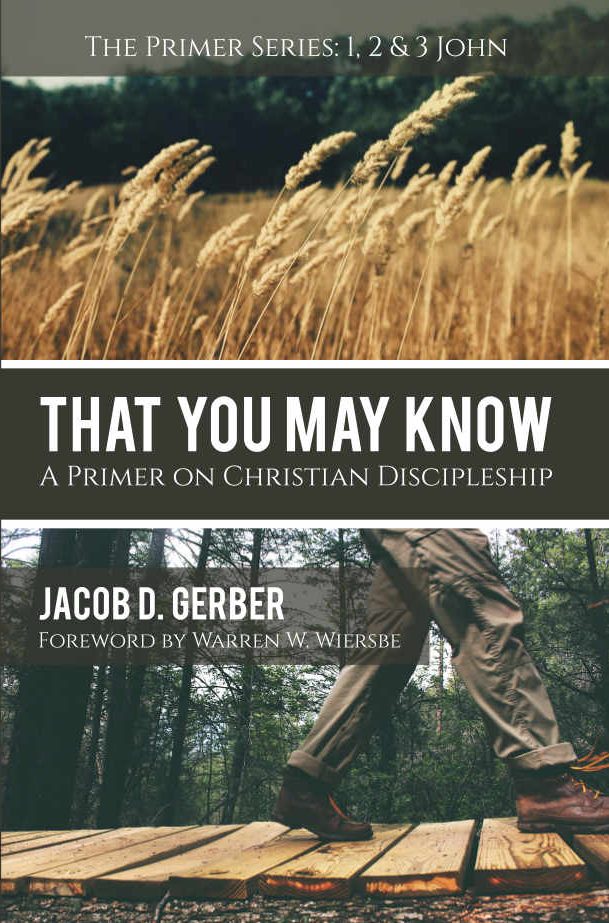Books

While there are many books written about Christian discipleship, there are not nearly enough books on discipleship that primarily expound the Bible itself. The Apostle John wrote three letters, however, with the main purpose of helping disciples to grow.
That You May Know: A Primer on Christian Discipleship is an enriching study that will lead you through John’s teaching on following Jesus as a disciple.
This book is more than a commentary and more than a topical book on the subject of Christian discipleship. Instead, this is a primer on Christian discipleship written as a careful reading of God’s word in 1, 2 & 3 John. It’s ideal for your own individual devotional reading or as a helpful resource for your group Bible study.
Download the First Two Chapters of That You May Know for Free
Bible Studies: Paul's Letter to the Philippians
Studies from my forthcoming pastoral commentary on Paul’s Letter to the Philippians, Have This Mind: A Primer on the Cruciform Life.
Access the complete set of Bible studies from Philippians here.
Bible Studies: The Gospel of John
Access the complete set of Bible studies from the Gospel of John here.
John 6:60–71: The Preservation of Jesus
Jesus preserves his people through a variety of applications of his word: promises, assurances, and warnings. (Exposition of John 6:60–71)
John 6:22–59: The Food of Jesus
Rather than living by feeding on bread, hungry sinners may feed on life by faith in the death and resurrection of Jesus. (Exposition John 6:22–59)
John 6:1–21: The Presence of Jesus
Although the world likes to divide winners from losers along the lines of pleasure and suffering, Jesus unfolds a different criteria for success in life. (Exposition of John 6:1–21)
John 5:19–47: The Authority of Jesus
Jesus heals on the Sabbath not to pick a fight, nor to develop a theology of the Sabbath, but to reveal the greater works that his Father has sent him to do. (Exposition of John 5:19–47)
John 5:1–18: The Sabbath Rest of Jesus
Jesus keeps the Sabbath by restoring restful work to those carrying the burden of inactivity and fruitlessness. (Exposition of John 5:1–18)
John 4:43–54: The Word of Jesus
When a royal official asks Jesus to heal his sick child, Jesus challenges the inadequacy of this father’s faith—and ours. (Exposition John 4:43–54)
Bible Studies: The Book of Genesis
Access the complete set of Bible studies from Genesis here.
Genesis 26:12–33: The Blessings for Isaac
God works all things together for good, but he does not eliminate pain. Rather, God blesses his people by promoting his kingdom. (Exposition of Genesis 26:12–33)
Genesis 26:1–11: The Covenant of Isaac
Isaac must choose between God’s promises and the forbidden fruit of Egypt. In order to be saved, God requires us to abide in Christ. (Exposition of Genesis 26:1–11)
Genesis 25:19–34: The Birthright of Jacob
The earthly-mindedness of Esau loses everything, while the heavenly-mindedness of Jacob gains everything. (Exposition of Genesis 25:19–34)
Genesis 25:1–18: The Completion of Abraham
Abraham’s death teaches that in order to fulfill his promises completely, God does not fulfill his promises immediately. (Exposition of Genesis 25:1–18)
Genesis 24:1–67: The Commissioning of Abraham
Abraham seeks a bride for Isaac on the basis of faith. God provides what he promises through promises and prayers. (Exposition of Genesis 24:1–67)
Genesis 23:1–20: The Commerce of Abraham
Sarah dies before the fulfillment of God’s promises, but death is not the end. Genesis 23 anticipates the resurrection. (Exposition of Genesis 23:1–20)
Bible Studies: Paul's First Letter to the Corinthians
Access the current set of Bible studies from 1 Corinthians here.
Bible Studies: The Letters of John
Access the complete set of Bible studies from the Letters of John here.
Bible Studies: The Gospel of Luke
Access a handful of Bible studies from the Gospel of Luke here. These were studies written during the Advent season of 2018. At the moment, I do not have plans to continue working through the Gospel of Luke; however, I wanted to make these few studies available online for whomever may benefit from them.
Bible Studies: The Book of Ecclesiastes
Access the complete set of Bible studies from the Book of Ecclesiastes here.
Bible Studies: The Gospel of Matthew
Matthew 21:23–27: By What Authority?
The only legitimate authority is the authority that is given from heaven. Even Jesus came to do the will of his Father in heaven. (Exposition of Matthew 21:23–27)
Matthew 21:18–22: “If You Have Faith”
When Jesus withers the fig tree, he does so to teach an important lesson: spiritual fruitfulness comes by faith, not by formalism. (Exposition of Matthew 21:18–22)
Matthew 21:10–17: The Messianic Prophet, Priest, and King
When he enters into Jerusalem and cleanses the temple, we see decisive proof that Jesus is the Messianic Son of David. (Exposition of Matthew 21:10–17)
Matthew 21:1–9: “Behold, Your King is Coming to You”
When Jesus enters triumphantly into Jerusalem, he defies all expectations. King Jesus came to save his people in unexpected ways. (Exposition of Matthew 21:1–9)
Matthew 20:29–34: “Lord, Have Mercy on Us, Son of David”
As Jesus heals two beggars, he reminds us of the call and promise from Psalm 131:3: “O Israel, hope in the Lord from this time forth and forevermore!” (Exposition of Matthew 20:29–34)
Matthew 20:20–28: A Ransom for Many
As Jesus approaches Jerusalem, he prepares to come into his kingdom. Those around him must prepare also to share in Christ’s sufferings. (Exposition of Matthew 20:20–28)


















